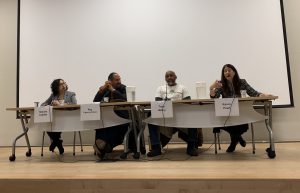A panel of four experts on food availability met at the Silberman School of Social Justice at Hunter College to discuss solutions to food scarcity in poor communities. Each panelist promoted an all-encompassing sociological approach to eradicating food scarcity. Without the means or education necessary to gain a sustainable wage, residents will continue to suffer from food injustice and the system of poverty that engenders scarcity will perpetuate itself. “We see this vicious cycle,” panelist Tony Hiller said. “How do we break it?”

The four members of the panel were Tony Hillery, Founder and Executive Director of Harlem Grove, an organization that promotes urban gardening and mentorship amongst elementary aged students in Harlem; President Ray Figuera Reyes of the NYC Community Gardening Coalition, a coalition that advocates for the preservation and creation of community gardens and urban sustainability; Shanna Castillo, Director of Resident Economic Empowerment and Sustainability for the New York City Housing Authority (NYCHA); and President and CEO Karen Pearl of God’s Love We Deliver, an organization that delivers meals to sick residents of New York City who are incapable of attaining food on their own.
Hillery spoke first, detailing his belief that community gardening in urban areas helps to combat food deserts, or areas where healthy food is not available or attainable to children. “I think we are the result of our environment,” he said, going on to explain that children are malnourished, leading to health problems and behavioral issues at school when the children show up hungry. He spoke about working in public schools and seeing the neglect of children in poor communities. “The kids aren’t learning, they aren’t eating, they aren’t getting proper service, and that’s what prompted Harlem Grown in the first place.”
Hillery believes that educating the children of Harlem about food, its source and its value is the best way to effect lasting change in the community. “If a child plants it they will eat it,” he said. Health and sustainability, Hillery insists, will lead to a population of children who are more engaged and better educated, and therefore more willing and able to provide for their future and the future of their community. “We plant seeds in the ground, but more importantly we plant seeds in the kids’ heads.”
As part of his job as President of the NYC Community Gardening Coalition, Reyes oversees Brook Park Youth Farm, an organization that employs young people as an alternative to incarceration in the south Bronx. “We represent the poorest urban congressional district in the nation,” Reyes said. He believes that his program allows young people a level of engagement with food that will promote sustainability and accountability later in life.
Reyes believes that hunger causes children to misbehave in school. “Its not a given that you’re eating [breakfast],” he said. Students who arrive at school hungry become ‘hangry,’ said Reyes, referencing a common slang term that identifies the anger and agitation that results from going unfed. “That means a teacher who lacks cultural competency will perceive them as being recalcitrant, being insubordinate.” The South Bronx has one of the highest school suspension rates in the nation. Reyes referenced a study done by the New York Civil Liberties Union that linked suspension rate to incarceration, implying that a major catalyst for the high rate of incarceration amongst people of color begins with food injustice and is exacerbated by the cultural ignorance of figures of authority.
Castillo spoke about her role in the NYCHA, saying that her department, Resident Economic Empowerment and Sustainability (REES) works to “secure economic opportunities” for housing authority residents and make sure that they become self-sufficient. To ensure self-sufficiency, REES helps the residents find jobs and education. Castillo believes that the lack of self-sustenance “is what gets to the core of the food scarcity issue.”
Karen Pearl’s organization, God’s Love We Deliver, cooks and delivers food to sick people in the city. Pearl says that while the meals are the keystone of the organization’s function, “the meal is the carrier. Really what we’re delivering is nutrition and education.” She hopes to teach the recipients how food can help them become healthy again and maintain a sustainable diet.
Pearl claims that 80 percent of food scarcity issues are the product of social determinants. “If we could look at fixing that 80 percent we will have a much healthier society, much better health outcomes across all populations.” She believes that jobs, housing, and education are essential to creating a healthy environment for residents and eradicating food scarcity.
The organizations the panelists represent are each seeking to disrupt the system of poverty and institutional neglect in the city, be it through educational or financial means. The panelists all agreed that empowering poor communities to become self-sustaining is the key to a more productive and secure future, or as Reyes put it a “community taking ownership over its destiny.”
